In Greek mythology, Hephaestus is one of the most unusual Olympian. Besides being associated with the element fire and the geophysical phenomenon of volcanoes, Hephaestus is also the God of blacksmithing. In Greek legends, he referred to as the “the celestial artificer”. He was thus revered by sculptors, carpenters, metal workers, artisans and other such craftsmen. He was worshiped in the manufacturing and industrial centers of Greece, particularly Athens. Hephaestus’ symbols are a smith’s hammer, anvil and a pair of tongs. The Roman God Vulcan is the later adaptation of him. Hephaestus is the son of Hera (queen of the Gods), whom she either conceived herself (parthenogenesis) or from her husband Zeus, the king of Gods. In contrast to the other Greek Gods, Hephaestus is ugly, stocky and lame. He is often depicted with crippled feet and described by epithets like “the lame” and “halting”. Yet he is the husband of Aphrodite, the goddess of love, beauty and passion. Hephaestus was rejected at birth and grew up in the Greek island of Lemnos, where he supposedly learned his smithing skills. He later returned to Olympus and was blacksmith of the Olympians. Hephaestus is often portrayed as a supporting God in Greek myths, being called upon for carving out exquisite weapons for the Gods, making the first mortal woman Pandora and other such favors. Know more about the Greek God of fire from the 10 most famous myths featuring Hephaestus.
#1 Birth of Hephaestus
There are different myths regarding the birth of Hephaestus and his parentage. According to one branch the Goddess Hera conceived him alone through parthenogenesis (virgin birth), as a revenge on her husband Zeus who had done the same with Athena. Another versions states that Hephaestus was born before the marriage between Zeus and Hera, on Lemnos island in the northern Aegean Sea. He was left here in the care of a blacksmith named Kidalionas and Hephaestus learned the blacksmith trade from his caretaker. There are also other versions that identify Zeus, the king of Gods, as Hephaestus’ biological father.
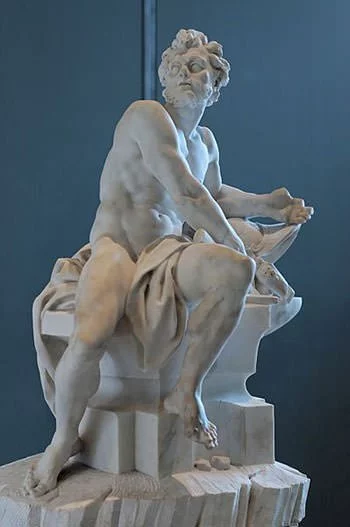
#2 Thrown off From Heaven
According to one branch of myths, Hera was so ashamed of her ugly and deformed child Hephaestus that she decided on throwing him down from Olympus. Hephaestus fell from the heavens landing in the area of Lemnos and getting severely injured in the process. Here he is picked up and rescued by sea nymphs Thetis and Eurynome, who shelter and provide for him in his early years. In an alternative version of the story, once Hera attempted to destroy Herakles (Hercules) with a storm after putting her husband to sleep. However Zeus came awake and was furious on her attempts at harming his mortal son. In his rage Zeus hung the Goddess in fetters from heaven. A young Hephaistos tried to intervene and attempted to free his mother from these bonds. Zeus was further enraged and threw him out of heaven. He fell to earth landing severely wounded on the island of Lemnos, where he was taken care of and taught to be a master craftsman by the Sintians; an ancient tribe native to that island.
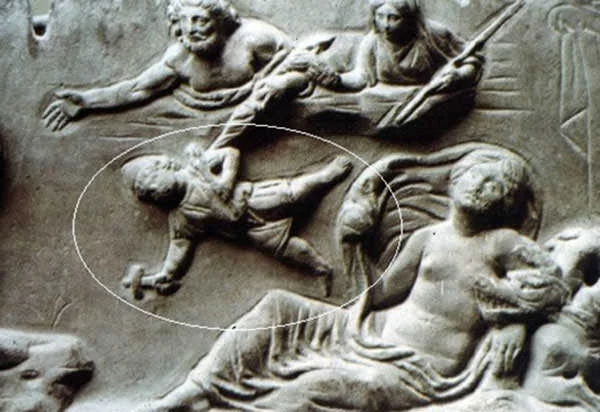
#3 Hephaestus, Thetis And Achilles
In Greek mythology Thetis was a sea Goddess and one of the 50 daughters (Nereids) of the ancient sea God Nereus. In Hormer’s Illiad, Thetis was married to the Greek hero Peleius, with whom she bore the greatest known Greek warrior Achilles. During the Trojan War, Achilles’ friend Patroclus once borrowed his armor and went to fight the Trojan prince Hector. In the battle that followed, Hector defeated and killed Patroclus and took the armor. Concerned for her son, Thetis asked Achilles to wait while she fetched him a new set of armor. Thetis had tended to Hephaestus as a child, when he had fallen from Olympus. She thus requested the God of blacksmiths himself to create a set of armor, including a shield, to defend her son. Hephaestus is happy to oblige her and dedicates himself to forging a magnificent armor and an impressive shield for the Greek Hero. Achilles is thankful for the armor and uses it to defeat the greatest fighter of Troy, Hector.
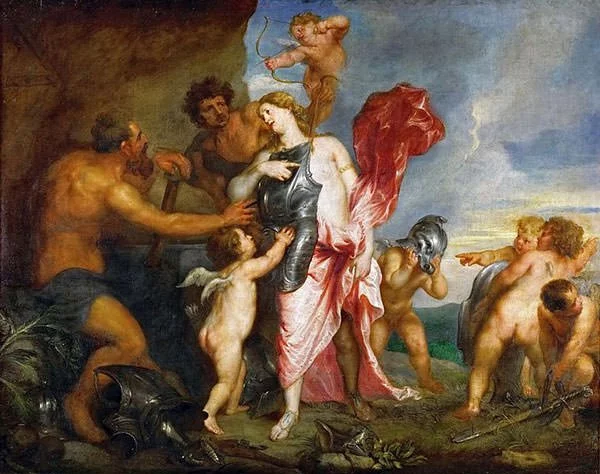
#4 Battle With Skamandros
In the 10 year long battle for Troy, the gods entered into the fight joining either on the side of the Achaeans (Greeks) or of the Trojans. Skamandros or Scamander was the deity of the river Scamander (Karamenderes) that flowed from Mount Ida across the plain beneath the city of Troy. Skamandros fought on the side of the Trojans in the war. Once when Achilles was slaughtering the Trojan allies near the river, Skamandros was angered by the corpses which were congesting the flow of his waters. The river God confronted Achilles and feeling insulted by the warrior engaged him in battle. Knowing that Xanthos may drown Achilles the Goddess Hera called upon Hephaestus for help, and instructed her son to attack Skamandros. Hephaestus entered the battle firstly burning the numerous corpses slain by Achilles and then boiling the waters of the river. This caused Skamandros great pain and he backed off, promising Hera and her son not to fight on the side of the Trojans again.
#5 Revenge of Hephaestus
According to some Greek mythic traditions, Hephaestus got his revenge with his mother Hera for throwing him away from the heavens. Once he gifted Hera with a beautiful golden throne which he had crafted with his own hands. The mother Goddess was thrilled and accepted the gift with alacrity. However when she finally sat on her new throne, Hera found herself tied to it. Hephaestus had purposefully integrated numerous delicately fashioned magical cords into the piece which were invisible. The trap was his revenge on his mother who had rejected him at birth. The Gods of Olympus rushed to Hephaestus, pleading him to release Hera and promising him a place in heaven in return. Hephaestus did not budge initially but was finally convinced when his friend Dionysus (God of wine and festivity) got him drunk. In some additions to the story, just before Hephaestus was about to release Hera, Zeus appeared and expressed his concern with the situation. Though Hephaestus had decided to let go off his mother, he took advantage of the situation. In return for releasing Hera, he asked his father for the hand of Aphrodite (Goddess of beauty) in marriage. Zeus felt he had no choice and relented. Hera was finally released, Hephaestus returned to Olympus again and was married to Aphrodite.
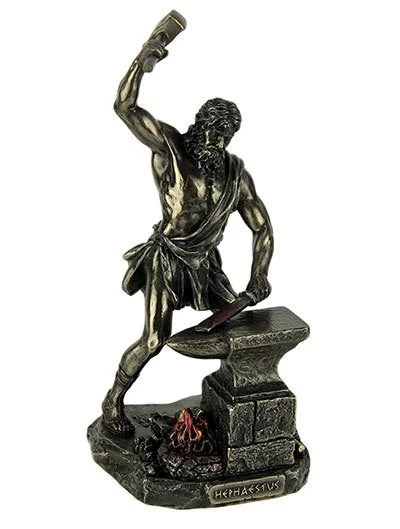
#6 Marriage With Aphrodite
An ugly and deformed Hephaestus’ marriage to the Goddess of beauty Aphrodite is a subject of interrogation among many, despite the several other qualities possessed by the former. So how was the lame Hephaestus able to marry Aphrodite? According to Greek myths, Aphrodite had a long list of suitors which included Poseidon (God of Sea), Hermes (messenger God) and Ares (God of war). This led to several quarrels among the Olympians and in order to bring peace to the heavens, Hera (queen of the Gods) decided that Aphrodite would be married to her son Hephaestus. To Hera, he was the ideal candidate to diffuse the situation, the one who least desired Aphrodite among all others. In another noteworthy account mentioned before, Hephaestus tricks his father Zeus to marry Aphrodite.
#7 Aphrodite And Ares
The long marriage of Hephaestus and Aphrodite was tumultuous and troublesome. The couple did not bear any children together but had many children with other partners independently. Aphrodite had a number of lovers and affairs while she was married to Hephaestus. Once while Aphrodite was having a secret affair with the God of war Ares, the couple were seen by the sun God Helios in their act. Full of indignation, Helios sought the God of fire and told him everything. Hephaestus was deeply hurt and decided on his revenge. He designed an intricate net with gold threads, so thin that it was barely visible and yet highly resistant. He then set up his trap on his bed. Ares visited Aphrodite again and when both the lovers were getting intimate, they found themselves trapped in Hephaestus’ net. At this moment Hephaestus appeared along with all the Gods of Olympus and they laughed together at this humiliating moment for the couple.

#8 Hephaestus And Athena
Hephaestus and Athena have much in common being the Gods that taught various arts and skills to mankind. Despite being considered soulmates by some, their relationship remains ambiguous with no single tradition ever clearly established on this subject. According to a story, Hephaestus once developed strong unrequited feelings for Athena while the later was visiting his workshop for some weapons. A lascivious Hephaestus thus pounced on her and chased her when she ran from him. After catching her with some effort (he was lame), Hephaestus forced himself on Athena and tried to rape her. The virgin Goddess however did manage to throw him away but Hephaestus had by now expelled his semen on her thigh. Athena wiped the seed off her thigh with a piece of wool and hurled the cloth from Olympus. As the cloth landed on earth, the goddess of earth, Gaea, was accidentally impregnated by the semen of Hephaestus, and bore a son named Erichthonius. Athena raised the child as her own, feeling responsible for him in some way.
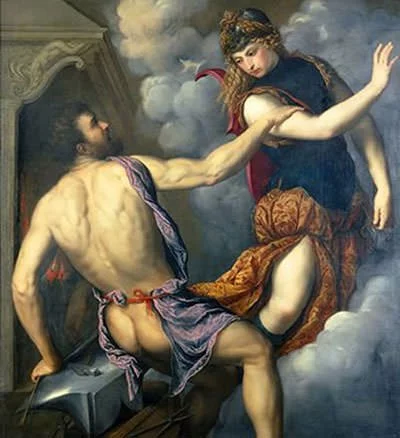
#9 Prometheus And Pandora
Once Zeus punished mankind by taking away their ability to make fire. As mankind suffered from the consequences of the curse, a young and smart man named Prometheus came up with a plan. Prometheus knew where to find the smithing God Hephaestus, and was aware that fire would always burn where the God would reside. According to the story, Prometheus visited Hephaestus and tricking the Gods stole fire back for mankind. This enraged Zeus who decided that since taking away the fire itself was a punishment, humans needed to be punished more severely. Hephaestus was thus summoned and asked to create the first mortal woman out of clay and water. Hephaestus obliged his father and Pandora was thus created. Pandora was blessed by the Gods and sent as a gift to Epimetheus, the brother of Prometheus. Despite being warned by his brother, Epimetheus could not resist Pandora and fell in love with her. Pandora was presented with a pithos (jar, also crafted by Hephaestus) as a wedding gift by the Gods. She was however also given a peculiar instruction to never open her gift. A curious woman, Pandora finally decided to have a look and let loose misery, disease and death upon humans. Zeus thus succeeded in his plan to punish humanity.
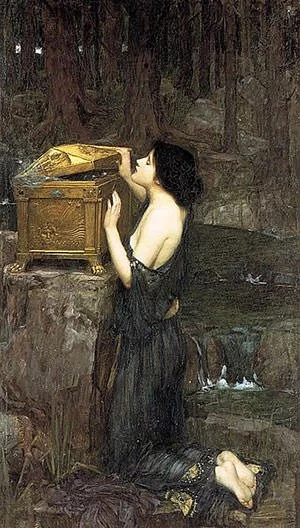
#10 Other Myths of His Craft
Hephaestus is credited with crafting the most fabulous weapons and objects in the Greek myths. He created the palaces of all the Gods and Goddesses on Olympus, the winged sandals and helmet of Hermes, Helios’s chariot, the girdle of Aphrodite, the arrows of Eros and Appolo, the breast-plate of Diomedes, the sword of Perseus and several other things.
Heracles’ (Hercules) Bronze Clappers
During Heracles’ 6th labor of the “The Stymphalian Birds”, the Hero is unable to progress. He is then helped by Athena who presents him with the Bronze Clappers crafted by the smithing God Hephaestus. Heracles uses the weapon to good effect by scaring the birds and shooting them down, thus completing his labor.
Necklace of Harmonica
Aphrodite had cheated on her husband Hephaestus with Ares and Harmonica was the child of the affair. When Harmonica was being married to the King of Thebes, Cadmus, she was gifted with a necklace by Hephaestus. The necklace was crafted by the God of fire himself and was cursed to bring misfortune to anyone who possessed it. Hephaestus succeeded in his revenge and Harmonia and her husband were turned into serpents. Their daughter Semele, who inherited the necklace, was also destroyed by the curse.
Automations
Hephaestus built automations to assist him in his work. He crafted himself handmaidens made of gold, who were able to understand him, speak to him and assist him. Among other automata, Hephaestus built tripods that could walk; sculpted golden dogs to guard the palace of Alcinous; and crafted Talos, a giant bronze man to protect the island of Crete.

